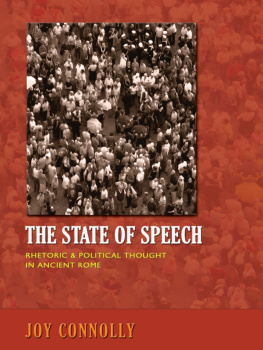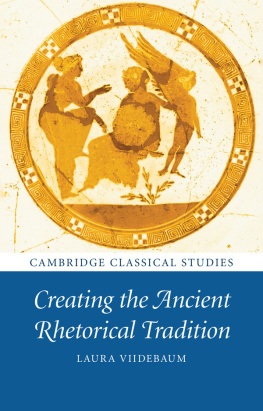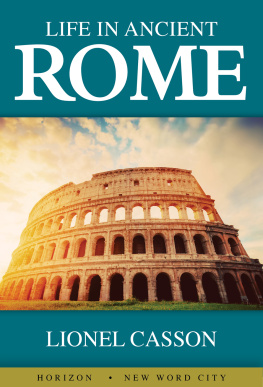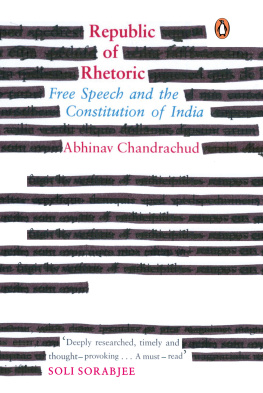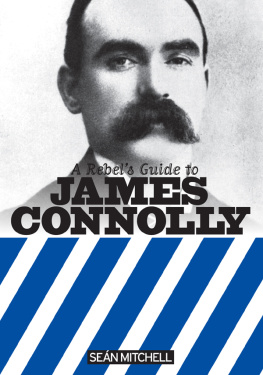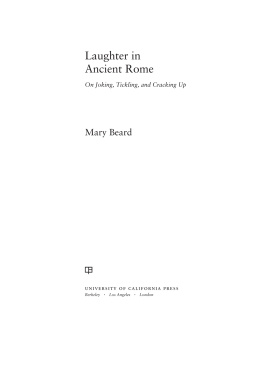Connolly Joy - The State of Speech: Rhetoric and Political Thought in Ancient Rome
Here you can read online Connolly Joy - The State of Speech: Rhetoric and Political Thought in Ancient Rome full text of the book (entire story) in english for free. Download pdf and epub, get meaning, cover and reviews about this ebook. City: Princeton, N.J., Rome, Rome (Empire), year: 2007, publisher: Princeton University Press, genre: Politics. Description of the work, (preface) as well as reviews are available. Best literature library LitArk.com created for fans of good reading and offers a wide selection of genres:
Romance novel
Science fiction
Adventure
Detective
Science
History
Home and family
Prose
Art
Politics
Computer
Non-fiction
Religion
Business
Children
Humor
Choose a favorite category and find really read worthwhile books. Enjoy immersion in the world of imagination, feel the emotions of the characters or learn something new for yourself, make an fascinating discovery.
- Book:The State of Speech: Rhetoric and Political Thought in Ancient Rome
- Author:
- Publisher:Princeton University Press
- Genre:
- Year:2007
- City:Princeton, N.J., Rome, Rome (Empire)
- Rating:4 / 5
- Favourites:Add to favourites
- Your mark:
- 80
- 1
- 2
- 3
- 4
- 5
The State of Speech: Rhetoric and Political Thought in Ancient Rome: summary, description and annotation
We offer to read an annotation, description, summary or preface (depends on what the author of the book "The State of Speech: Rhetoric and Political Thought in Ancient Rome" wrote himself). If you haven't found the necessary information about the book — write in the comments, we will try to find it.
Connolly Joy: author's other books
Who wrote The State of Speech: Rhetoric and Political Thought in Ancient Rome? Find out the surname, the name of the author of the book and a list of all author's works by series.
The State of Speech: Rhetoric and Political Thought in Ancient Rome — read online for free the complete book (whole text) full work
Below is the text of the book, divided by pages. System saving the place of the last page read, allows you to conveniently read the book "The State of Speech: Rhetoric and Political Thought in Ancient Rome" online for free, without having to search again every time where you left off. Put a bookmark, and you can go to the page where you finished reading at any time.
Font size:
Interval:
Bookmark:
The State of Speech
The State of Speech
RHETORIC AND POLITICAL THOUGHT IN ANCIENT ROME
Joy Connolly
PRINCETON UNIVERSITY PRESS
PRINCETON AND OXFORD
Copyright 2007 by Princeton University Press
Published by Princeton University Press, 41 William Street, Princeton, New Jersey 08540
In the United Kingdom: Princeton University Press, 3 Market Place, Woodstock,
Oxfordshire OX20 1SY
All Rights Reserved
Library of Congress Cataloging-in-Publication Data
Connolly, Joy, 1970
The state of speech : rhetoric and political thought in Ancient Rome / Joy Connolly. p.cm.
Includes bibliographical references and index.
eISBN: 978-1-40082-794-7
1. Cicero, Marcus TulliusCriticism and interpretation. 2. Cicero, Marcus TulliusPolitical and social views. 3. RomePolitics and government26530 B.C. 4. Latin languageRhetoric. 5. Rhetoric, Ancient. 6. Political sciencePhilosophy. I. Title.
PA6320.C66 2007
808.00937dc22
2007007150
British Library Cataloging-in-Publication Data is available
This book has been composed in Sabon
Printed on acid-free paper.
pup.princeton.edu
Printed in the United States of America
1 3 5 7 9 10 8 6 4 2
For Michael, my particular friend
Art, great art, transformed courage, right decisions, magnificent oratory into something different and superlative... Neither action nor style could have accomplished the result alone. Everything felt the touch of his arthis appearance and gestures, the siren suit, the indomitable V sign for victory, the cigar for imperturbability. He used all the artifices to get his way, from wooing and cajolery through powerful advocacy to bluff bullying; yet he never overruled the Chiefs of Staff. What we are discussing here is not merely the direction of great affairs, but the creation and development of personality.
Dean Acheson, Present at the Creation, 59596
CONTENTS
ACKNOWLEDGMENTS
I BEGAN TO GRAPPLE IN EARNEST with the main themes of this book not long after September 11, 2001. Never had the distance between the daily practices of citizenship and the exercise of political power seemed to me so great, and for a long time, the things I wanted to say about public speech and civic identity in republican thought rang hollow to my own ears. The thanks I express here are all the more whole-hearted because each person reminds me of the value of clear thinking and commitment to humanist inquiry in anxious times.
Thanks go first to the Classics faculty at Stanford, who offered me a postdoctoral fellowship in Latin literature at an early stage in my turn toward the history of political thought, and who in subsequent years tolerantly encouraged my explorations into areas well beyond their original job description. I am especially grateful to my Stanford colleague by courtesy in the Department of Political Science, the late Susan Moller Okin, who gave me many helpful offprints and books and urged me to track down connections between ancient and modern treatments of rhetoric and citizenship. Thanks to the time and lovely space provided by a Laurance S. Rockefeller Fellowship at the Princeton University Center for Human Values in 20034, I was able to rewrite the draft from start to finish, benefiting throughout from contact with the Fellows and Princeton faculty in Classics and Politics. The company of my colleagues at my new home at New York University, not to mention the view of the Empire State Building from my study window, eased the final revisions. Over the years I have leaned heavily on the knowledge and encouragement of members of the Department of Classics at the University of Washington in Seattle, and I thank them warmly for welcoming me into my first faculty position and maintaining strong collegial links over the years. And I would not be writing these acknowledgments at all were it not for Bridget Murnaghan, Joseph Farrell, and Ralph Rosen, of the University of Pennsylvania, who guided my first forays into rhetoric and gender studies with keen criticism and goodwill.
My students in my courses on rhetoric and the history of political thought were excellent critics of some of the arguments made here, and I am grateful to them, especially the graduate students in my seminar on republicanism at Stanford in 2002, Marcus Folch, Lidewijde de Jong, Corby Kelly, Jack Mitchell, and Danielle Steen. For their perceptive comments on various chapters in progress, I thank audiences in Austin, Chicago, Davis, Los Angeles, New York, Philadelphia, Seattle, and Stanford. Sasha Watson of the French Department at NYU provided prompt help at a critical point. Ann Bergren wisely convinced me to change my original title. Special thanks to those who read parts of the manuscript at different stages or offered other, less easily described forms of inspiration: Alessandro Barchiesi, Ruby Blondell, Barbara Fuchs, Maud Gleason, Alain Gowing, Michael Halleran, Stephen Hinds, Andromache Karanika, William Levitan, Michle Lowrie, Stephen Macedo, Richard Martin, Daniel McLean, Andrea Nightingale, Josiah Ober, Patricia Parker, Michael Peachin, Jim Tatum, and Froma Zeitlin.
Bob Kaster read the next-to-last draft of the manuscript, supplied many pages of judicious comments, and saved me from many mistakes. Andrew Riggs by and one anonymous reader for Princeton University Press provided immensely useful comments and helped clear the way for the final revisions. The responsibility for any remaining errors is mine. I am very lucky to have worked with Chuck Myers at Princeton University Press, who maintained his support despite delays and unexpected changes of direction.
Debbie Tegarden shepherded the manuscript through production with expert grace. Marjorie Pannells love of Latin and of clear prose made for learned, sensitive copy editing. Thanks finally to my affectionate, generous family. I owe a great deal to the encouragement of my mother in particular, whose early guidance in literature and art spurred my interest in classical culture.
In Ciceros greatest dialogue, de Oratore, a young man named Cotta asks his host, Licinius Crassus, what he needs to make the most of his talents. Crassus smiles and replies, What else do you think, but zeal, and a truly passionate devotion? Without them, no one would ever achieve anything great in life. I love that answer, and the smile that goes with it, and I am happy to dedicate this book to someone who shares my appreciation. I thank Michael Strevens for his commitment to the world of ideas, his patience, and his many gifts of mind-opening books.
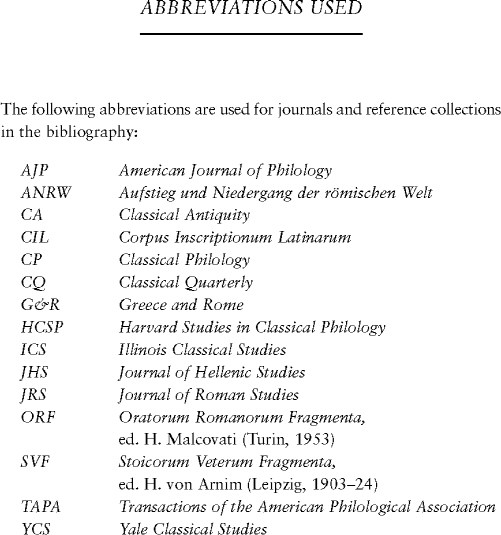
The State of Speech
Introduction
RHETORIC AND POLITICAL THOUGHT
JUST AS ROMES LEGIONS left their mark on the map of Europe, Roman ideas about citizenship and constitutions helped frame Western political thought. The concept of individual liberty guaranteed by law, the beliefs that the end of political rule is the common good and that the community stands and falls on the civic virtue of its citizens, a strong notion of collective identity expressed in terms of cultural solidarity and common love for the fatherlandthese compose the core of republican political ideas that, through the texts of Sallust, Cicero, Vergil, and Livy, were revived starting in the twelfth century by European thinkers seeking to develop alternatives to feudal government, and that remain matters of concern to political theorists today. In this book I pursue a new approach to republican political thought in Rome, one that explores notions of civic virtue and collective identity in texts that seek to guide and govern public speechin writings belonging to the discipline known since Platos time as rhetoric. I treat rhetoric, especially the work of Cicero, as an extended engagement with the ideals and demands of republican citizenship. Above all, I concentrate on rhetorics representation of the ideal orator, which I read as an exploration of the ethos of the ideal citizen. Just like the persuasive speech he utters, this citizen is a complex, paradoxical construction, at once imperious and responsive, masterly and fragile, artifical and authentic, who seeks civil concord through the exercise of seductive authority.
Next pageFont size:
Interval:
Bookmark:
Similar books «The State of Speech: Rhetoric and Political Thought in Ancient Rome»
Look at similar books to The State of Speech: Rhetoric and Political Thought in Ancient Rome. We have selected literature similar in name and meaning in the hope of providing readers with more options to find new, interesting, not yet read works.
Discussion, reviews of the book The State of Speech: Rhetoric and Political Thought in Ancient Rome and just readers' own opinions. Leave your comments, write what you think about the work, its meaning or the main characters. Specify what exactly you liked and what you didn't like, and why you think so.

